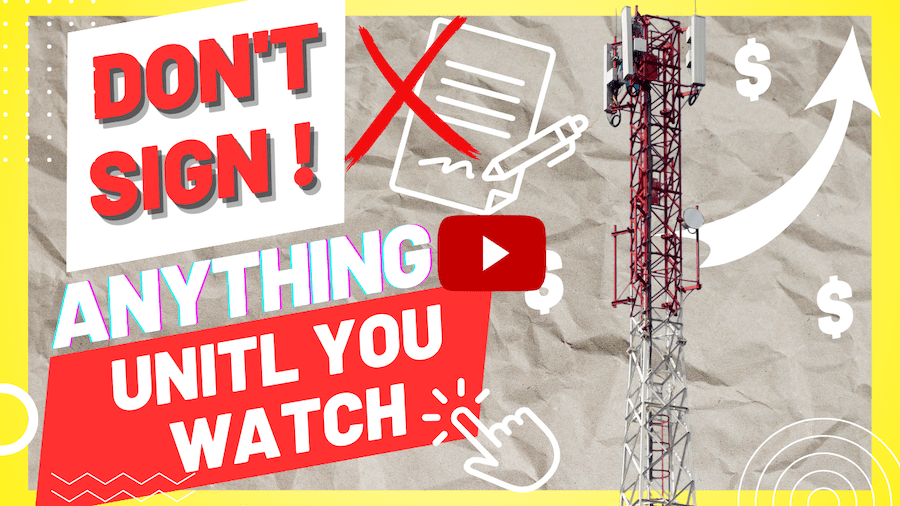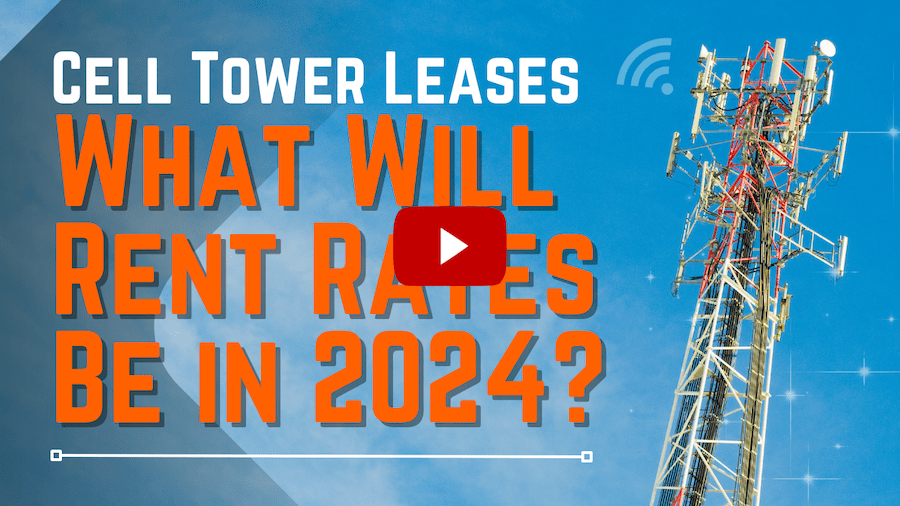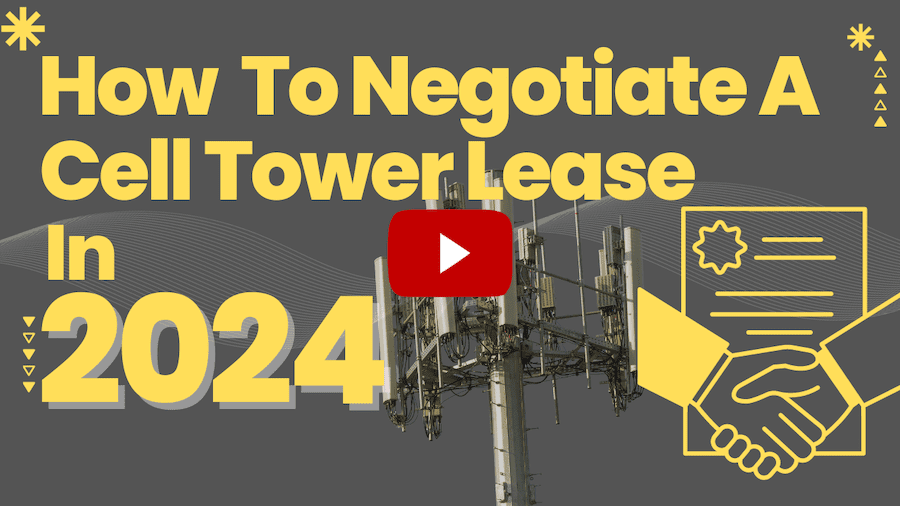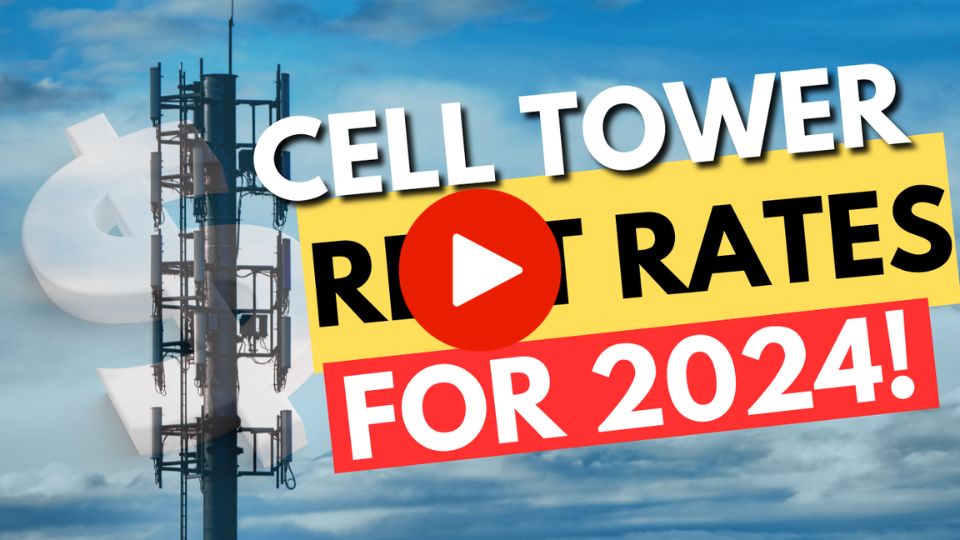Lately there has been a lot of discussion about the race for 5G and cell tower companies increasing their need for additional cell towers. Expanding their networks also means these companies need space to put these towers.
Rather than buy all the land they need, they rent it from local governments, business owners, schools, churches, and even individual property owners. Cell tower leases represent a tremendous financial opportunity for the landowners of residential and commercial property — if they negotiate properly.
What Is A Cell Tower Lease?
There is an ever-growing need in the wireless industry to provide faster service to its customers while at the same time providing them the ability to download more and more data.. The only way this can occur is to upgrade existing telecom equipment and more equipment to densify existing wireless networks.
As a result, cellular companies are continually looking for new places to add towers. That usually means placing the tower on private property or government property. When they find a place to put up a new tower, they often will enter into an agreement with the property owner or the branch of government they wish to utilize the property.
Though cell tower leases are some of the lesser-known leases in the world, they are a potential asset for those who have the property for a tower. The lease grants the tower or cellular company to put a cell tower on the landowners’ property in exchange for rent paid by one (or more) of the following:
- Cellular company such as Verizon, T-Mobile, AT&T, or Sprint
- Tower companies such as American Tower and Crown Castle
How Much Do Cell Phone Tower Leases Pay?
Each landowner and tower company (Verizon, AT&T, T-Mobile, American Tower, etc.) have to agree on the amount that will be charged for the use of the property by the cell tower company. The rates range in price from $100 to more than $75,000 per year.
The tower company pays a landowner for the right to use the land; however, each one of these leases is an individual contract. There is no “set” amount of rent because each cell tower site has a different value. For example, your land may be a more ideal location than any of your neighbors for a wide variety of reasons so it’s impossible to compare rates in that way. No matter what a cell tower company tells you there is no such thing as “Market Rents” in the cell site industry.
With more than ten-thousand traditional cell sites being added every year and over one hundred thousand 5G cell sites being added annually, the cell tower companies are employing teams of experts to protect themselves during the process. As a result, often, property owners accept offers far below what they deserve to be paid. We estimate that the average cell tower lease is underpaid by over $850,000 over the life of the lease.
How Do I Get a Cell Tower On My Property?
A cell company will not put a tower on your property, no matter how much you petition them to do so unless there is a need for them to do so. Cell companies are like every company; they must have a profitable reason to put towers up in areas. That means no matter how you might want a tower on your property; the cell tower companies might never require it to be there.
How Much Revenue Does A Cell Tower Generate?
In general, a cell tower company will generate revenue based upon the type of tenants located on the cell tower, the types of equipment that a tenant installs on that tower and number of tenants they can attract to the tower.. With the build of 5G and other upgraded equipment being added to towers for wireless networks, tower companies can generate more money than ever from their towers.
When a landowner authorizes a cellular company to put a tower of their property, the mobile company is obliged to pay the landowner. The landowner is presently paid anywhere between $100 – $5,000+ per month for the use of the property.
Though that might sound like easy passive income, keep in mind that most landowners are under-compensated.
How Do I Locate Cell Towers?
There are many methods of locating a cell tower near you. These methods include the following.
- Using a cell tower locator map
- Finding your carriers nearest tower by visiting their coverage map
- Using an app like OpenSignal
- Relying on your cell phone’s antenna
- Trying a cell phone signal booster
Are you looking for more information about local towers? We can send you a custom report with details about the towers in your area.
Is Living Next to a Cell Tower Bad for You?
According to the American Cancer Society there is not enough evidence to support the idea that cell towers cause cancer. Here are some reasons why:
-
The RF (radiofrequency) waves from cell towers are low (like the RF waves of a microwave) and nowhere near as high as x-rays.
-
The wavelength is also significantly shorter. This makes it highly unlikely to affect individual cells in the body.
-
The current level of these waves is very low (again, similar to radio stations or tv broadcast stations).
Scientists tend to generally agree that there are unlikely that cell towers can cause cancer. While the ACS also recognizes that additional studies on humans and cell phone towers should be done, they maintain that the exposure from actual cell phone use is far more than a tower.
How Much Does A Cellular Tower Cost?
It is expensive to build a cell phone tower. Costs average roughly $300,000 for the construction of a new tower and many companies but this amount can be significantly more due the area the cell tower is being installed and the type of tower required. For example, a stealth cell tower, one that is designed to look like a tree, a clock tower or a flagpole can greatly increase the cost of that tower and at the same time limit functionality.
Are Cell Towers Real or Personal Property?
Each municipality is different. Some jurisdiction will classify a cell tower as real property; others will specify the tower is personal property. Having a cell tower on your private property is a relatively new concept. Some restrictions do exist as to where a cell tower can be installed, these restrictions can be based on local, state or even federal regulations..
Furthermore, depending on the classification of the cell tower located on your property the tax consequences to you can vary. When you host a mobile tower on land you own, you have to pay income tax on the rent received. But whether you should pay personal property tax or real tax to host the tower is another question. We cannot answer the subject within the body of this text. It will depend on the jurisdiction you are in; by this, we mean your state and local governments. Contact us if you’re unsure about your particular situation.
How Far Does a Cell Tower Reach?
Many factors play a role in your mobile device, picking up a signal from the nearest tower. These all include the distance you are from the cell tower, the signal, and the strength of your mobile network. If the tower is in an area with many obstructions such as trees, buildings, and hills, you would also have trouble picking up its signal.
If you live in a rural area, the indicator on your phone may have to travel some distance to the nearest tower. Typically, a cellphone’s antenna can have a range that extends several miles from the cell tower location. However, that is not always the case. The biggest factors in the range of a cell tower are the type of telecom equipment located on the cell tower and topography/elevation of the land immediately surrounding the cell tower..
5G towers/equipment offer much faster speeds but their wireless signal range is just a small fraction of a traditional cell site.. Due to changes in technology, large towers will be supplemented with many small towers, aka small sites, throughout communities. You will see 5G sites every few hundred feet in certain parts of the town and this is due to their range limitations.
Do Cell Phone Towers Decrease Property Value?
There are many illusions about what a cell phone tower will do to a residential neighborhood. One major concern is whether or not the cell tower will be an eyesore. Many new towers are disguised to blend in with their surroundings and 5G towers are much smaller and less obtrusive.
Another fear is the panic that many still have around health concerns. However, as noted earlier, there is little evidence to suggest this fear is founded.
Property owners often wonder if the mobile tower brings down the land value of the homeowner and surrounding homes.
In many communities, homeowners do not need to worry about their property value decreasing because there is a tower in the neighborhood. More and more people are thankful for nearby cell towers as it improves service. However, some communities don’t like them and have even banned them altogether.
Who Owns the Most Cell Phone Towers?
Most everyone knows who AT&T, Verizon or T-Mobile are due the hundreds of millions of dollars they spend on advertising. However, most people would be surprised to know that these companies own just a small fraction of the cell towers located in the United States.
Almost 65% of all cell towers in the United States are owned by either American Tower, Crown Castle or SBA Communications. These are the “Big 3”” cell tower companies. They do not have any customers but they play a very important part in most people being able to use their cell phone each and every day.
The Big 3 are publicly traded REITs and their primary purpose is build the infrastructure (i.e. cell towers) necessary for AT&T, Verizon, T-Mobile and Sprints of the world to install and operate their equipment. Think of it like, the Big 3 being the company that builds the roads needed for the cars that you use every day to get from place to place.
How Many Cell Towers Are There in the US?
The number of cellular towers in the United States has steadily grown year after year. There has never been a year where there have been more towers taken down than new ones constructed, not even close. As people move toward more tech dependency, they also desire faster wireless service with little disruption. To provide this, cell phone companies have added new towers every year. Approximately 15,000 new towers went up in 2018 alone.
With the latest 5G service hitting the market, there is even greater need for more towers erected. Currently, there are more than 300,000 towers in the US with an estimated 800,000 new cell sites added by 2026 due the 5G explosion
Why Are Cell Phone Towers Disguised?
Cell towers are sometimes disguised or in the industry they are referred to as being a stealth tower, to help blend into their surroundings and lessen the visual impact to the immediately surrounding areas. Some municipalities do not allow cell towers at all in certain areas of their city due to their height of the structure or the overall negative impact they may have aesthetic of a neighborhood or other community in the immediate proximity.
However, most of the over 300,000 cell towers presently located in the United States in most are not disguised and look a lot like this:
Bottom Line: How Do I Know If I Have A Good Deal?
The bottom line is that building a cell tower may be a significant investment for a tower company but as the landowner you have something of real value to them.
Think of it like an oil company wanting to use your land, they may have invested a great deal of money in the equipment necessary to get to the oil but the equipment is worthless if they are not drilling in the right location.
A cell tower transaction is no different, both parties, the cell tower company and the landowner bring something to the table, so remember make sure you get the right value for your side of the equation.
The tower companies have experts on their side. Shouldn’t you?

 CLICK HERE TO WATCH
CLICK HERE TO WATCH CLICK HERE TO WATCH
CLICK HERE TO WATCH CLICK HERE TO WATCH
CLICK HERE TO WATCH

